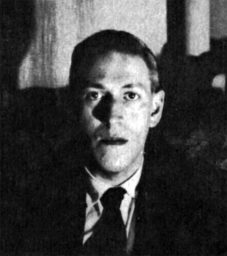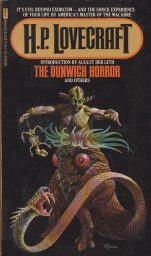I agree that “At The Mountains Of Madness” went on too long, but I disagree with your analysis of where. I liked the logistics and the vanilla wilderness survival section of the story. I thought that was paced well, with the growing sense of things going off the rails once they were far from help and snowed in.
It was the part where the characters reached the city of the Old Ones that felt too long to me. Part of it was the interminable descriptions of the mosaics telling the history of the Old Ones and the Shoggoths–not only is the narrator telling us what they say, he’s telling us things that I couldn’t imagine being clear from a series of pictures, particularly ones made by aliens, describing alien events.
That, in my opinion, could have been cut down to “Entered ancient city, saw shoggoth, ran from same.”
-
That is where “The Shadow Out of Time” is its superior, narrator’s familiarity with the ancient race and their history is far more believable whereas it is quite hard to swallow in “At The Mountains Of Madness”. Finale was quite a bit more frightful, too.
I dunno. You may be on to something in that I agree there does seem to be a point past which tension is drained away. And, I’d agree about The Case of Charles Dexter Ward. Unfortunately, in terms of my own favorite stories, they belie this idea. My favorites are his longer works: The Shadow Out of Time and in particular At the Mountains of Madness.
But, it is his medium length works that do seem to be the general fan favorites: Cthulhu, Innsmouth, Dunwich, and Colour. So, maybe I’m the oddball.
Dang it, been too long since I read them; can’t make a decision.
Good question, though.
You mean whetting the audience’s appetite, not ‘wetting’.
Yeah Mountains of Madness was way too long IMHO. I had even forgotten about the ending, which is so atypical for a Lovecraft story and i think the weakest part. That mid range game is terrific though. All time favorite is Colour out of Space. As a Western Mass native I also have a special place in my heart for Dunwich, which takes place closer to Springfield than Boston
I consider “The Call of Cthulhu” to be Lovecraft’s most overrated work. While very good in setting things up, it was terribly anti-climactic and didn’t have an interesting twist to compensate. [My personal belief is that it became so well known in popular culture because Cthulhu is the only big bad that had an extensive physical description, resulting in his becoming the ‘face’ of Lovecraft’s villains.]
In contrast, I did not actually think that “The Shadow over Innsmouth” was very good for most of the story. Serviceable, certainly. Not bad. But while the situations and events were all mysterious and horrifying for the protagonist, they weren’t at all to me, the reader, with Lovecraft’s exposition sitting fresh in my memory. But that ending! Even though I suspected it was coming, it was still horrible to watch it happen. At the end of the day, Innsmouth is one of my favorites (I don’t think it quite breaks into my top 5) and Cthulhu is nowhere (which is not to say it’s one of his worst; merely in the unremarkable middle).
“The Shunned House” I actually consider to be quite good. There is something terrible about watching a slow, creeping, inevitable destruction. I think the only thing keeping it from being one of his greats is the fact that he did the same sort of thing, but better, in “The Color out of Space” (Lovecraft rehashed earlier ideas in new stories several times; Innsmouth is basically the same story as “Facts Concerning the Late Arthur Jermyn and His Family” dolled up a little).
I was amazed by “The Reanimator” simply because I didn’t expect to get creeped out by Zombies ever again.
“Hypnos” is my favorite of his short works. One can clearly see why everyone would consider the protagonist’s story insane, one can clearly see why he will never be able to convince anyone that he’s not, and there is left the niggling sensation in one’s brain that maybe, just maybe, he is simply insane after all.
About “The Dunwich Horror,” I need say nothing. Everyone is already aware that it is excellent.
I confess to liking “The Case of Charles Dexter Ward” considerably; before reading any Lovecraft, I was a fan of FFG’s game ‘Eldritch Horror,’ and it was a bit surprising to me to see such a huge lack of cults, magic spells, and Great Old Ones in his actual writing. Charles Dexter Ward was the first story chronologically (which is how I was reading them) that included all these elements (I am only speaking of the research and casting of magic spells done by the protagonists; earlier works certainly had magic as an element). Perhaps I would not have liked it so well if I had read “The Dunwich Horror” first, which likewise includes all the ‘Hollywood’ aspects but is a much better story overall.
In closing though, I would just like to say that story that surprised me the most, the most out-of-left-field concept, the least expected twist in ANY of Lovecraft’s works is to be found in the humble story “Old Bugs.” I laughed when I remembered when Lovecraft wrote and realized where the story was (or wasnt’?) going.
-
Sheesh, I got going and didn’t realize I’d gone on so long.
-
I like Innsmouth for its atmosphere more than anything else. “The Color out of Space” is also quite excellent and atmospheric, and there he also managed to pull out a personal tragedy, whereas same is (IMO) burred bellow dry genealogy in “The Shunned House”.
“The Dunwich Horror” is one of my favorites too, but I realize that it is fashionable to dislike it in the Mythos circles due to impossibility of presenting its supernatural/occult element in their materialistic SF frame, and obviously due to humans triumphing over outer evil.
No love for “The Dreams in the Witch House”? I just love how claustrophobic and suffocating it is, and that depiction of its protagonist’s descent into madness.
 Like most here, I’m a fan of HP Lovecraft’s stories. The imagination is astounding and the description vivid and memorable. However, when I first read these tales a few years ago, I was most impressed by Lovecraft’s technical writing prowess. He had a better, more articulate command of language than many serious dramatic writers possess, and was an expert at setting up tension and conveying a mood. I’m not surprised his writings have stood the test of time far better than some of the serious, critically-praised literature of that era (Thomas Wolfe, anyone?), and will likely be enjoyed generations into the future.
Like most here, I’m a fan of HP Lovecraft’s stories. The imagination is astounding and the description vivid and memorable. However, when I first read these tales a few years ago, I was most impressed by Lovecraft’s technical writing prowess. He had a better, more articulate command of language than many serious dramatic writers possess, and was an expert at setting up tension and conveying a mood. I’m not surprised his writings have stood the test of time far better than some of the serious, critically-praised literature of that era (Thomas Wolfe, anyone?), and will likely be enjoyed generations into the future. While it adopts a more global perspective, recounting bizarre events around the world, one can say the same for the excellent The Call of Cthulhu. While there are different editions, The Dunwich Horror is around 65-70 pages and The Call of Cthulhu is 40-50 pages.
While it adopts a more global perspective, recounting bizarre events around the world, one can say the same for the excellent The Call of Cthulhu. While there are different editions, The Dunwich Horror is around 65-70 pages and The Call of Cthulhu is 40-50 pages.